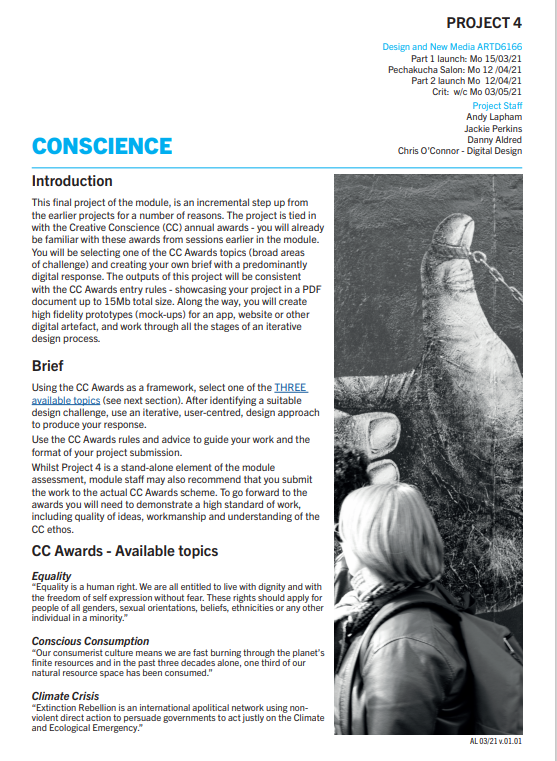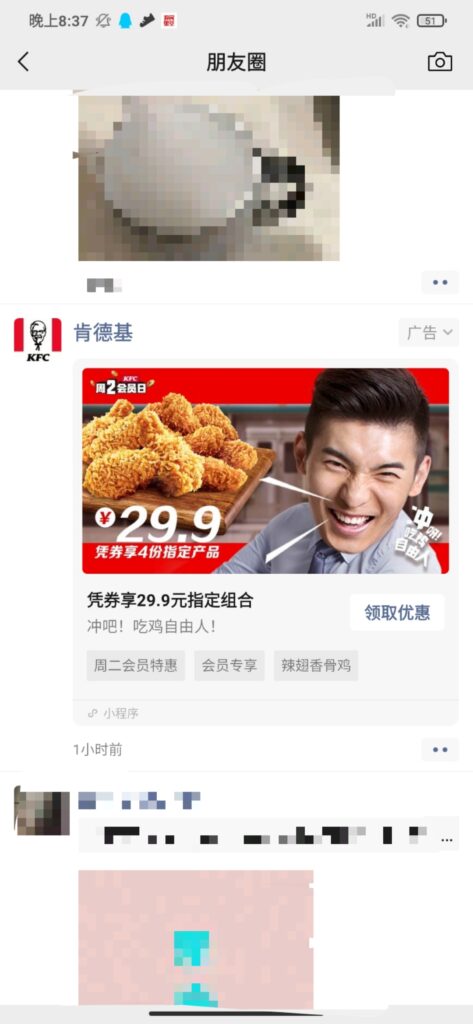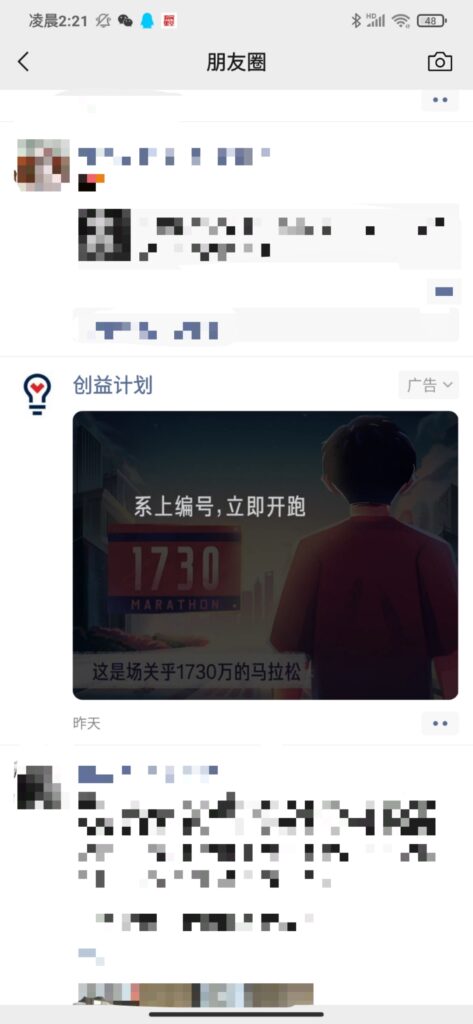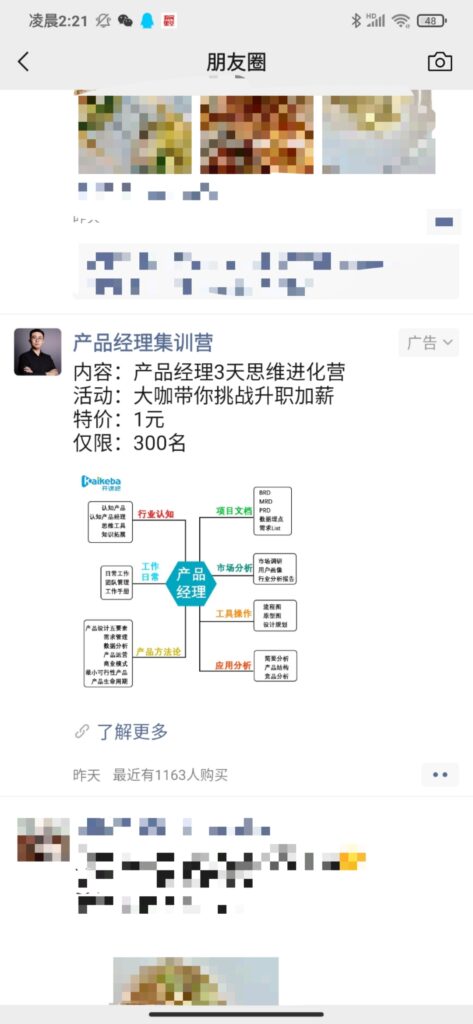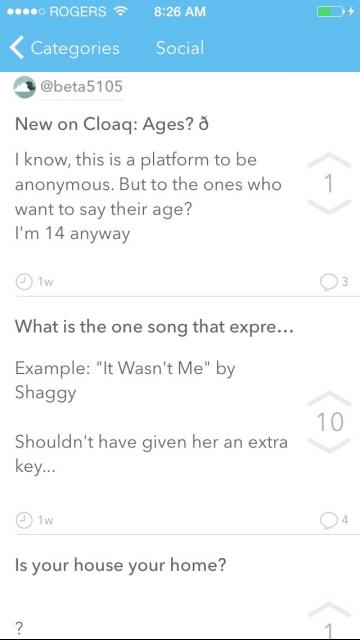PDF outcome for this project please download here:
Brief.
In summary, we will be looking into the topics from the CC Award, and pick one of the three topics to fully research and develop ideations for the further development.
Equality.
I chose equality as the topic for my project 4, because I think this is something that the entire world is facing, and it matters to everyone because it has strong relationships with humanity, value and dignity. I made a mind map to list out the types of equality, based on Universal Equality:
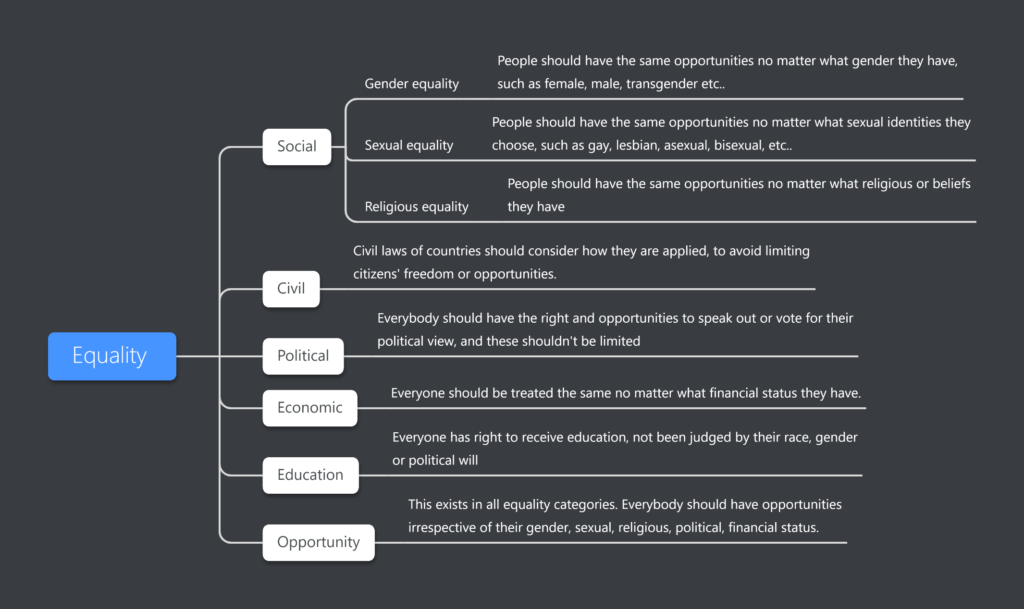
I then created another mind map to show my thoughts on each type of equality:
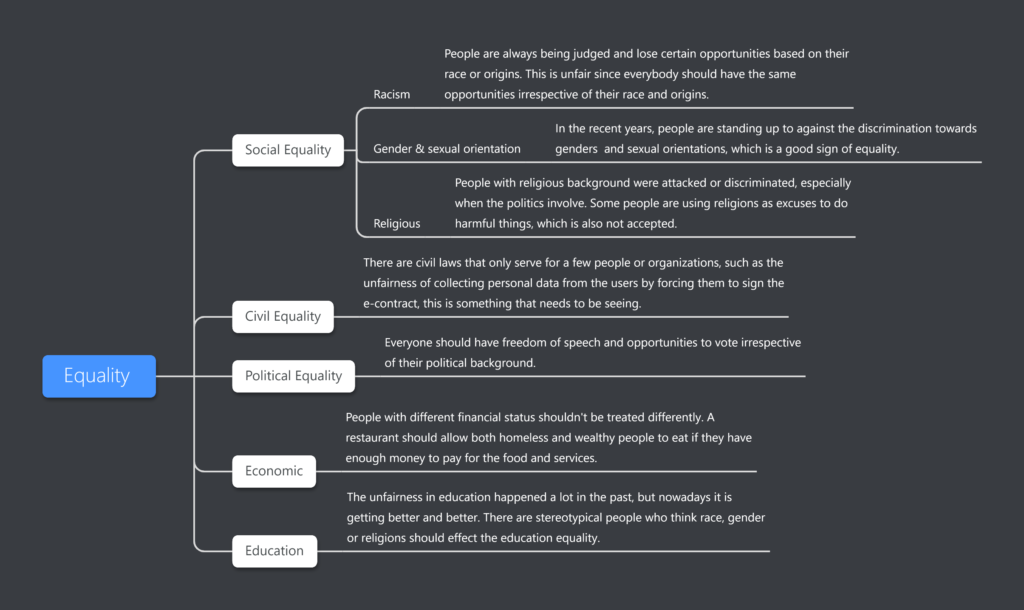
By listing down the different types of equality, I realized that most of the inequalities have been exposed nowadays, such as movements against racism, gender & sex and politics. Many governments are also changing the system and laws to allow everyone to be educated. However, there are things that haven’t been brought to our sights enough, which is a part of the equality of opportunity.
Almost everyone have used internet nowadays, and whatever you do and see will be recorded by the applications or the systems. Although the companies say that they will ensure the data is safe, our personal information is still exposed and there is always somebody watching them behind our backs. It is unfair that some companies forces the users to agree with the terms & conditions to use their apps. For instance, once I was trying to use a photo-editing app, and they tried to access to my phone call list, which is unnessaccary for the photo-editing. However, I need to allow them to access to use the functions. Why do I need to allow them to access to my personal data when it is irrelevant to the functions of the app? I have already bought the app which is fairly traded, and accessing our personal data shouldn’t be part of the trade because I did not agree with selling my personal information. Although the phenomenon is well-known, people are still been forced to provide their personal information to the intelligent companies, and we have not yet paid enough attention to this field. I see this as the inequality of opportunity, when we don’t really have a choice to not to provide any personal informations if we want to use the internet.
In conclusion, the topic for my project 4 is to design something that reflects the personal data leaking in our current society, to warn people that we do not have the choice to prevent this from happening.
Secondary research
Here is a detailed description of big data:
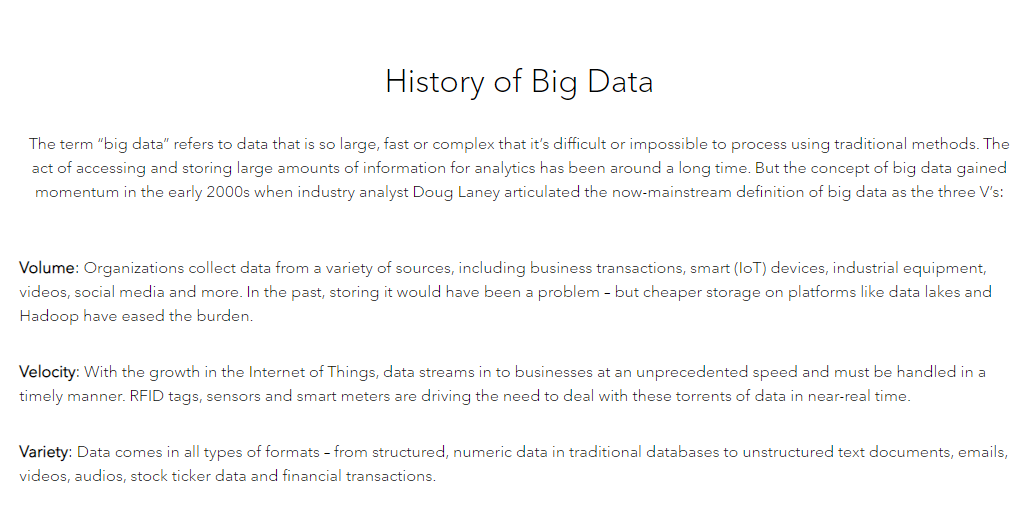
In summary, big data collects and stores data. Companies usually use the system of big data to collect users’ information and reflect based on what they collect. A good example to tell is Google. Vikas Arora wrote an article about Google and big data. He mentioned that google uses big data technologies to analyze users’ behaviour when using their platform for searching and return them the predicted results, in other words, the correct results that the users are looking for.
In my opinion, this might be good for searching things, because it does save a lot of time to find the right information. However, it shows that Google uses this technology to ‘stalk’ people’s behaviours. Whatever the users are doing on the platform, Google will know. Users are basically been exposed under Google’s watch. In addition, Facebook or instagram also uses this technology for advertisement. They collect users’ behaviour, locations or search histories to provide the ‘suitable’ advertisements.
Here is a video that describes more about the big data and why should you care:
Timandra Harkness concluded big data through breaking down D A T A:
D: for dimensions/diverse/different. By combining different types of data, a multi-dimensional picture will be shown, which contains all the information that we need to understand something specifically.
A: Automatic. Anytime we do anything, data will be generated automatically and become useful to someone.
T: Time. Data generates at any moment, and will be used to for prediction.
A: A.I. Computer programmes can find patterns in the data.
Here is a video about big data and privacy:
According to Jules Polonetsky, here are some restrictions to protect users’ privacies:

Although the policy is clear, it still comes to the risk when the companies decide what to do with your information. Jules Polonetsky says that it is more of an ethical issue: Can personal data helps more people? Is using these personal data harmful? Overall, it is still the company decides what to do with your data, not the users themselves. The companies or organizations need to collect these datas, and they are just balancing the needs and the risks.
Personally I think it is understandable to use data to benefit the world, however, the inequality of choosing not to provide data has been shifted to weather it is trustable to provide personal data to a specific organization or company. This means that we can’t choose to not to provide our data, and we don’t have choice to decide what data can be used, this is a very clear sign of inequality of opportunity.
Ted Myerson talked about his concept of having big privacy:
Speaking of the usage of big data, Ted Myerson mentioned that due the the policies and restrictions, many of the useful information can’t be shared or discovered. If they are used correctly, many unsolved problems can be solved, for example the cures for diseases and cancers. The ideal concept to deal with this issue, is to have something that allows users to choose what can be shared by themselves. I think this is a good idea to bring the equality of opportunity back, because it gives users chances to choose what to do, not the organizations or the companies.
Primary research ———– Big Data & Privacy.
After some useful secondary research, I wanted to know about people’s opinions on the big data and the concerns. Therefore I arranged an interview with my friends and family from the ages of 13 to 74, 20 interviewees in total . All names are fake due to the privacy issues.

Based on the interview outcome above, I created some charts and diagrams to show the results in clearer ways.
Percentage of people who had experience of forced data sharing:

Surprisingly, 75% of the interviewed had experience of forced data sharing after I explained them what it is. In my opinion, this is a horrible phenomenon that needs to be restricted.
Percentage of people concerning about big data:

It is interesting that even after knowing what big data is, almost half of the people don’t really concern or care about big data and force data sharing.
Relationships between ages and concerns about big data:
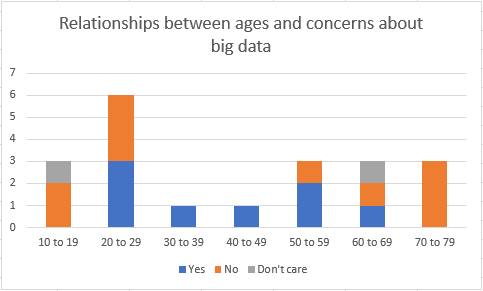
I also did an analysis about the relationships between ages and concerns, and it is intriguing to see that older people and younger people are tend to concern less than people between the age of 30 to 59. People around 20 to 29 have been splitted into two halves, one shows concerns and another one shows the opposite. It is obvious in the interview outcome sheet, that younger and older people put more trusts on the government and believe that big data is good for them. In addition, people between 30 to 59 concern more because they are more active on the internet and the reality.
Apps that might use big data:
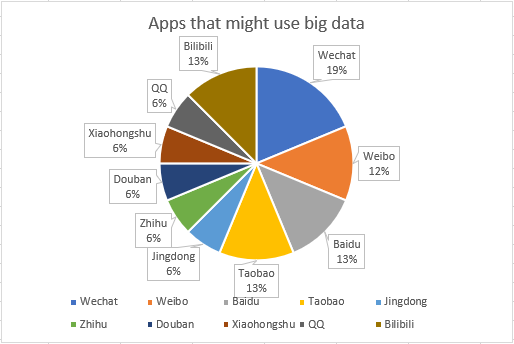
There is a chart to show the percentage of the apps that have been mentioned in the interview. As we see, Wechat is the most mentioned app among others, therefore in the next phase I will have a look at how Tencent uses big data in its product Wechat.
Wechat.
According to Anna Swanson (see here) :
Compared with Baidu and Alibaba, Tencent is sometimes seen as lagging behind in technology, with it focused more on spinning out new products than on cutting-edge research. However, ADG’s Sullivan says that Tencent could have the most valuable big data resources of all three companies because of its massive WeChat social networking app—resources that Alibaba and Baidu lack. WeChat gives Tencent extensive data on people’s personal connections and allows the company to chart who the “influencers” are in each social group, he says. That can help advertisers maximize their market spending by targeting those individuals.
Based on this piece of information, we understand that Tencent is actually using the benefit of collecting data from a message/social app and figure out who the users are and how they can influence their social group, to maximize the advertisement.
I have personally experienced couple of cases of big data:
Images above are Wechat discovery interfaces. Discovery is a function which is similar to Instagram, where you can share your life through pictures and texts to your social group. However, the difference between Wechat discovery and instagram is that everything you post can only be seen by your friends.
The reason why I posted these images is because I received advertisements in the discovery section, and they are not posted by any of my friends but WeChat it self. Interestingly, I have been using or searching apps/things about KFC, Charity and project management, and surprisingly, these things are appeared as advertisements on my discovery page. In my opinion, this is a clear sign of data collecting through the system of Big data, and somehow managed to show it in my WeChat page.
Anonymous App.
We have talked about how big data collects people’s information and ignore the privacy, now let’s take a look at the apps that was claimed to be ‘safe’.
Whisper.
The first app is called Whisper. The unique selling point for this app is that people can chat and post things anonymously. It provides a safe place for people to build their anonymous social group, and chat whatever they like without losing privacies. However, it causes a lot of trouble for child harassment and illegal contents due to the anonymous group chat feature.
Secret.
Secret is another anonymous app that shares very similar features as the Whisper. It was shut down due to the illegal contents shared on there.
Cloaq.
People have claimed that Cloaq is the ‘most anonymous app’. It doesn’t take your personal information at all and allows you to post and chat anonymously, just like the other apps. I personally think that this isn’t a great app which will definitely encounter underage issues as well as the illegal contents.
Personal thoughts.
In my opinion, most of these anonymous app share one common: they will always encounter illegal or uncomfortable contents such as underage harassment, racism, hate crime etc… I think the biggest reason for this is that everyone has ability to post and chat whatever they like. If this is not restricted, a lot of people will unleash their evilness and do bad things in these apps.
Here comes to another question: If our privacy is fully protected, how are we going to stop people from doing the bad things?
With this question, I decided to move on and find the answer in the later designs.
USER ANALYSIS.
Use Case.
I made a user case to showcase the Big data system. It shows how powerful the big data is, and everything is basically working around it.

Persona.
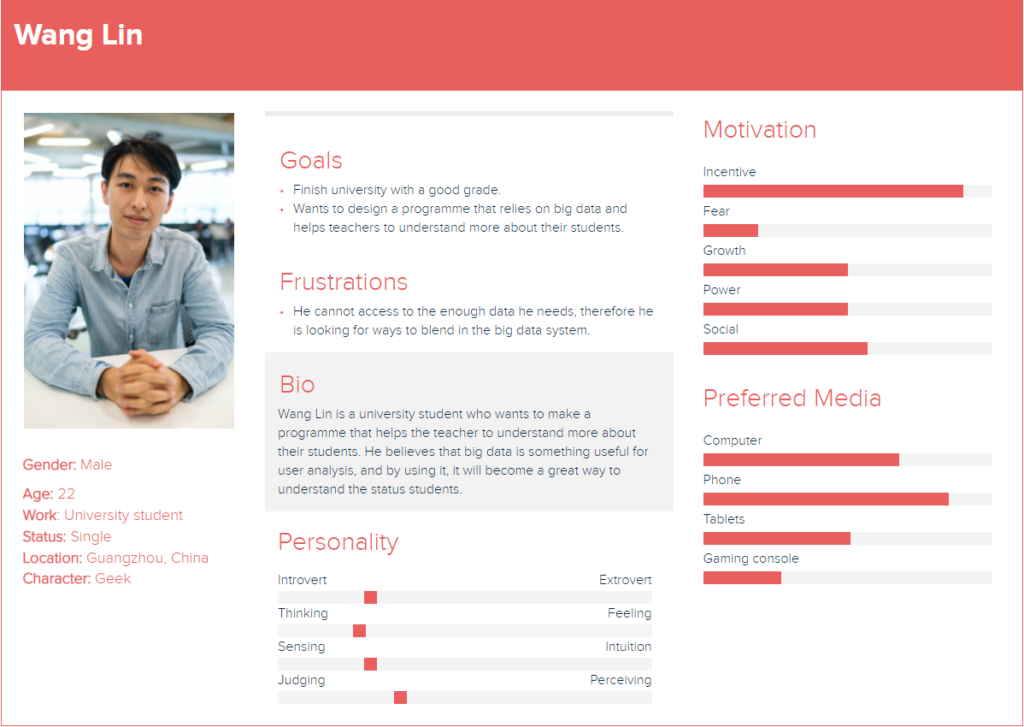


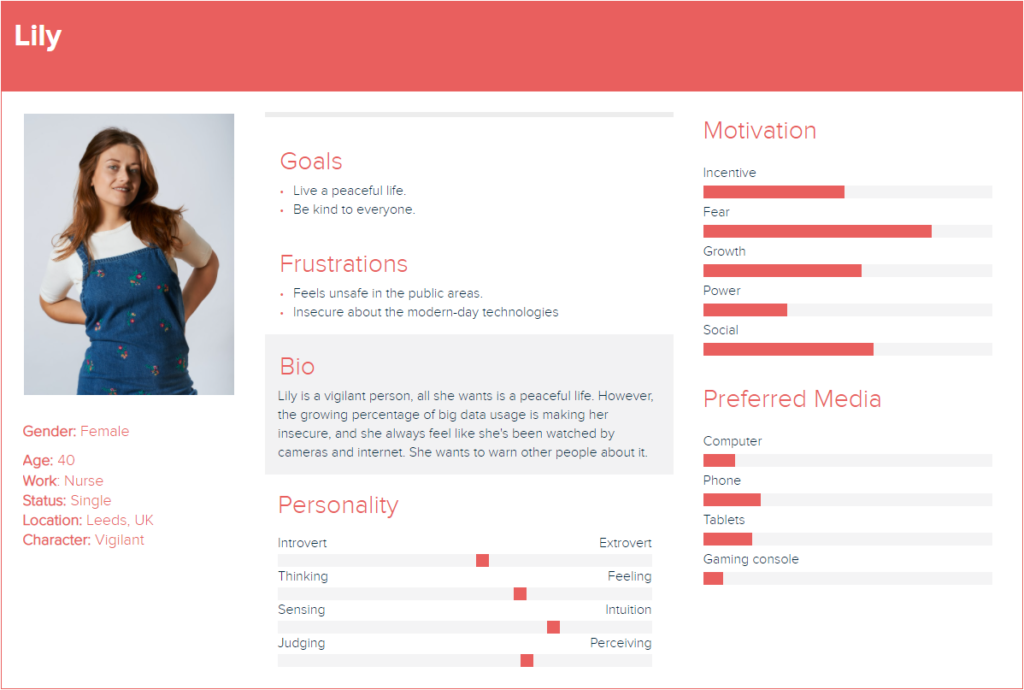
Insights.
Here is my insights before moving onto the design phase:

For more user/product analysis, design and creation, please visit: https://rylan.macd.work/designing-creating/
